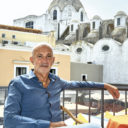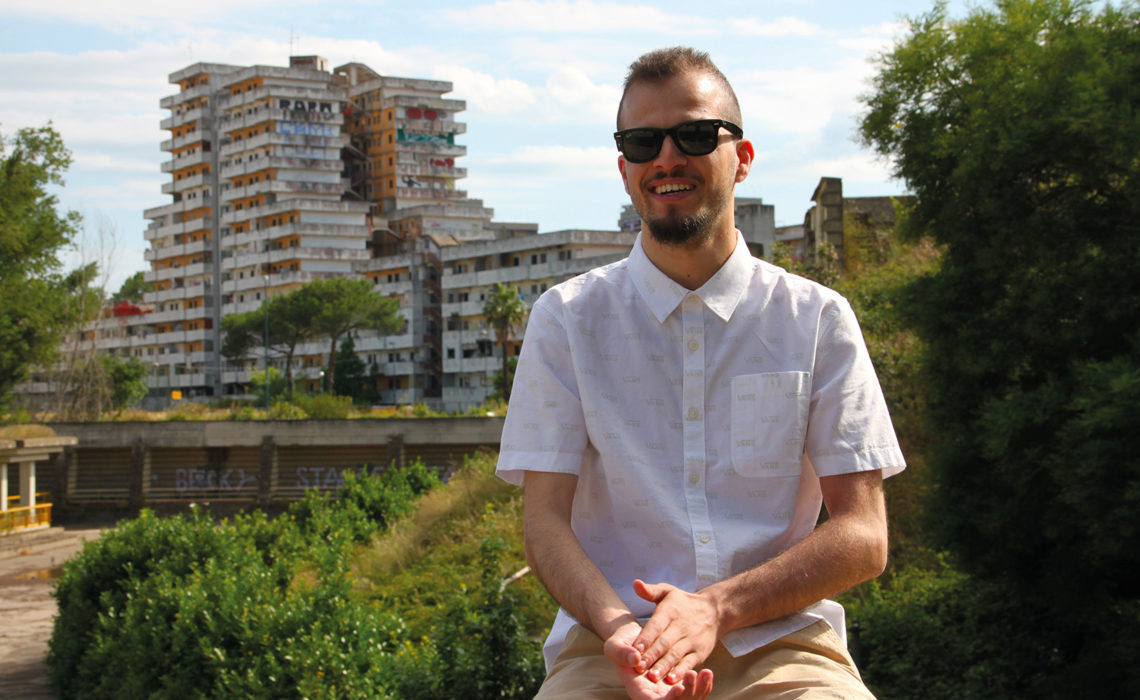Classe 1993, di talento e con la poesia nelle vene. Emanuele Cerullo, da Scampia – non certamente un quartiere napoletano che si associa alla bella letteratura – ha fatto della sua passione per la scrittura un lavoro, anche ben riuscito. Il suo “Ventre di Scampia”, libello di versi arditi ed estremamente originali, si è dimostrato un vero bestseller.
Com’è nato questo desiderio di scrivere?
“Scrivere è da sempre una necessità. Mi piaceva il potere fonico delle parole, mi divertivo con le rime e con le filastrocche: un groviglio di significati concentrati in armonia”.
Credi che essere cresciuto in un ambiente come quello di Scampia abbia influito sul tuo percorso?
“Indubbiamente. Se fossi cresciuto altrove non avrei assorbito né patito certe cose: non avrei capito come si vive in una periferia come Scampia e, soprattutto, in una delle Vele. Ho iniziato a scrivere a otto anni e la mia raccolta d’esordio, Il coraggio di essere libero, è stata stampata dalla mia scuola media, nel 2007. Quei componimenti li ho scritti tra i dodici e i tredici anni, nel periodo più cruento della storia di Scampia, quello della faida di camorra. Fuori si sparava e io, a casa, scrivevo con la finestra aperta”.
Senti il desiderio del riscatto?
“Sì, ed è un desiderio perenne, perché cresci e quel riscatto sociale diventa riscatto culturale, un modo per rimettersi in gioco dal punto di vista espressivo ed evitare di offrire al pubblico sempre le stesse cose. Negli anni che verranno, vorrei cercare di allontanare Scampia dalla mia poesia: la scrittura non può essere monotematica”.
Sei stato considerato dagli esperti del settore il ‘bambino prodigio della poesia’. Quanto ti riconosci in questa definizione?
“In realtà non mi riconosco in nessuna definizione, rischierei di essere incasellato e le etichette mi stanno strette. Cerco comunque di far capire che non ho nulla di prodigioso, il prodigio è sovrumano, io appartengo alla terra, nella terra affondo le mie mani. E continuerò a farlo”.
Con il tuo libro sei sempre in giro per l’Italia, anche come portatore di immagine positiva per il tuo quartiere.
C’è qualche aneddoto legato a queste occasioni che ti ha più lasciato il segno?
“Ho avuto la fortuna di incontrare persone di ogni età. Mi hanno colpito gli adulti, appartenenti a generazioni lontane dalla mia, che mi stringevano la mano ed evocavano la speranza. Ma quella stessa speranza viene evocata anche dai miei coetanei e puntualmente li esorto ad eliminare dal loro vocabolario questo concetto inteso come alibi: chi di speranza vive, disperato muore. Diamoci da fare. Io ce l’ho fatta, potete farcela anche voi. Rimboccatevi le maniche e coltivate le vostre passioni, giorno dopo giorno”.
E di Capri che mi dici?
“Ci sono stato molte volte. Mi piace l’idea di un’isola che appartiene a tutti e non appartiene a nessuno, inafferrabile e quindi fascinosa: Capri la conosci e la riscopri perennemente”.
POETRY THAT SAVES
Class of 1993, talented, and with poetry running through his veins. Emanuele Cerullo, from Scampia – surely not a Neapolitan neighborhood that you might associate with literature – has made of his passion for writing a successful career. His “Ventre di Scampia/Belly of Scampia”, a collection of daring and extremely original verses, has become an authentic bestseller.
How was this desire for writing born?
“Writing has always been a necessity. I liked the phonic power of words, I had fun with rhymes and verses: a tangle of meanings that focused in harmony”.
Do you believe that growing up in an environment such as Scampia influenced your path?
“Without doubt. If I had grown up elsewhere I would have not experienced and suffered certain things: I would have not understood how you live in a suburb like Scampia and, especially, in one of the Vele/Sails. I began writing when I was eight and my debut collection, Il coraggio di essere libero/The courage of being free, was printed by my middle school, in 2007. I wrote those compositions while I was between twelve and thirteen, during the bloodiest period in the history of Scampia, the blood feud of Camorra. Outdoor they were shooting at each other and I, at home, was writing, with my window kept open”.
Do you feel a desire for liberation?
“Yes, and it is an everlasting desire, because when you grow up, that social liberation becomes cultural liberation, a way to get back in the game under an expressive point of view and to avoid offering the public always the same things. In the following years, I’ll try to distance Scampia from my poetry: writing cannot be monothematic”.
Experts in the field considered you the ‘child prodigy of poetry’. How much do you recognize yourself in this definition?
“Actually, I don’t recognize myself in any definition, I would risk being labelled, and I am not fit for labels. I nonetheless try to make others understand that I’m nothing extraordinary, prodigy is superhuman, I belong to the earth and in the earth, I put my hand. And I’ll continue doing that”.
You’re always travelling Italy with your book, even brining a positive image for your neighborhood. Are there any stories tied to this occasions that left a mark?
“I was lucky to meet people of every age. The adults, belonging to generations very far from mine, struck me the most, they held my hand and invoked hope. The same hope comes from my peers as well and punctually, I exhort them to erase from their vocabulary this concept that is used as an alibi: who lives following hope, dies in despair. Let us work on this. I made it, you can make it too. Roll up your sleeves and cultivate your passions, day after day”.
What can you tell me about Capri?
“I went to Capri several times. I like the idea of an island that belongs to everybody and nobody, elusive and therefore charming: You perpetually get to know and rediscover Capri”.









No Comments